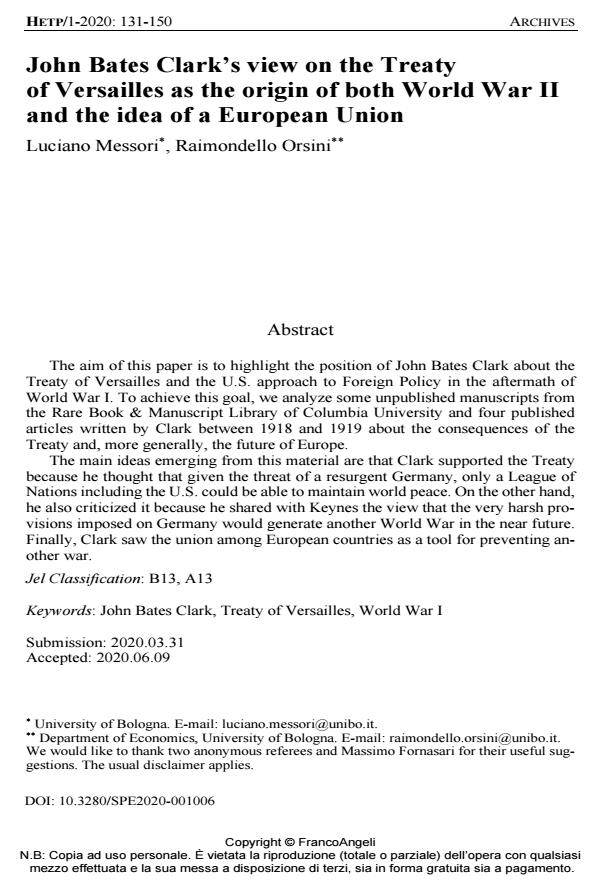John Bates Clark’s view on the Treaty of Versailles as the origin of both World War II and the idea of a European Union
Titolo Rivista HISTORY OF ECONOMIC THOUGHT AND POLICY
Autori/Curatori Luciano Messori, Raimondello Orsini
Anno di pubblicazione 2021 Fascicolo 2020/1
Lingua Inglese Numero pagine 20 P. 131-150 Dimensione file 113 KB
DOI 10.3280/SPE2020-001006
Il DOI è il codice a barre della proprietà intellettuale: per saperne di più
clicca qui
Qui sotto puoi vedere in anteprima la prima pagina di questo articolo.
Se questo articolo ti interessa, lo puoi acquistare (e scaricare in formato pdf) seguendo le facili indicazioni per acquistare il download credit. Acquista Download Credits per scaricare questo Articolo in formato PDF

FrancoAngeli è membro della Publishers International Linking Association, Inc (PILA), associazione indipendente e non profit per facilitare (attraverso i servizi tecnologici implementati da CrossRef.org) l’accesso degli studiosi ai contenuti digitali nelle pubblicazioni professionali e scientifiche.
The aim of this paper is to highlight the position of John Bates Clark about the Treaty of Versailles and the U.S. approach to Foreign Policy in the aftermath of World War I. To achieve this goal, we analyze some unpublished manuscripts from the Rare Book & Manuscript Library of Columbia University and four pub-lished articles written by Clark between 1918 and 1919 about the consequences of the Treaty and, more generally, the future of Europe. The main ideas emerging from this material are that Clark supported the Trea-ty because he thought that given the threat of a resurgent Germany, only a League of Nations including the U.S. could be able to maintain world peace. On the other hand, he also criticized it because he shared with Keynes the view that the very harsh provisions imposed on Germany would generate another World War in the near future. Finally, Clark saw the union among European countries as a tool for preventing another war.
Parole chiave:John Bates Clark, Treaty of Versailles, World War I
Jel codes:B13, A13
Luciano Messori, Raimondello Orsini, John Bates Clark’s view on the Treaty of Versailles as the origin of both World War II and the idea of a European Union in "HISTORY OF ECONOMIC THOUGHT AND POLICY" 1/2020, pp 131-150, DOI: 10.3280/SPE2020-001006